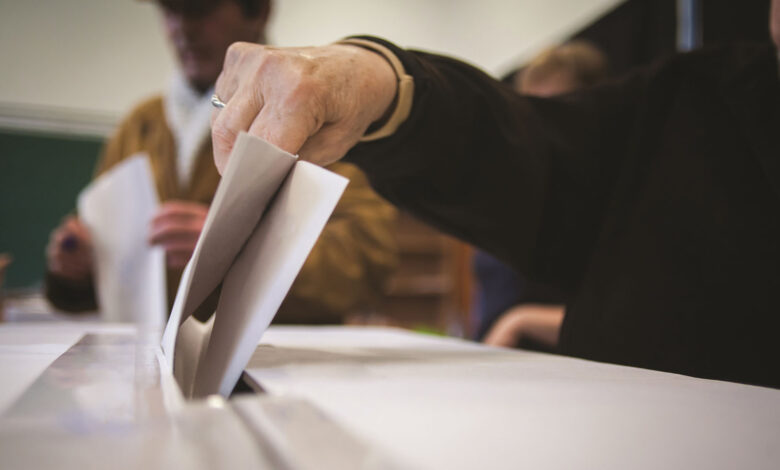Aontú bill aiming to allow presidential voting rights in the North

A new bill introduced in the Houses of the Oireachtas aims to allow Irish citizens living in Northern Ireland to vote in Irish presidential elections.
Launching the Bill, formally entitled the 39th Amendment of the Constitution (Voting Rights in Presidential Elections) Bill 2025, Aontú leader Peadar Tóibín TD said: “The Good Friday Agreement confirmed that people born in the North of Ireland have a right to be an Irish citizen,” adding “currently nearly 700,000 people in the North of Ireland have exercised that right, are Irish citizens and hold an Irish passport”.
Noting that Irish citizens in Northern Ireland have a “right to stand in the election”, he added that “the Irish State refuses them the right to vote”. Tóibín said neither Westminster nor Stormont have the power to grant this right to Irish citizens. He added: “It is in the gift of the people of this state and the Dáil,” he said. “It is this government that is preventing the full Irish nation voting as one for the first time since 1918.”
“The fact that the Irish Government are withholding democratic rights from 700,000 Irish people in the North is shocking. It is anti-democratic.
Opinion polls show that the vast majority of Irish people in the south of Ireland favour a referendum on a united Ireland.
“In the North there is growing support for a referendum even amongst many within the unionist population. The southern government is out of step with the Irish people. This Bill does not even go as far as a referendum but facilitates a real and practical step towards democratic self-determination.”
To vote in the presidential election, you must be an Irish citizen and normally reside in the Republic, with exceptions for Defence Forces personnel and diplomatic staff serving overseas. Changing the criteria for voting in the presidential election would necessitate an amendment to the Irish constitution which would require a referendum. The next presidential election is due to take place by November 2025.
In many countries – including European countries such as France and Poland – citizens of the state who are not resident in the jurisdiction, can still vote in presidential elections.

Assembly motion
On foot of Aontú’s announcement, Sinn Féin tabled a non-binding motion in the northern Assembly in early-May 2025 calling for Irish citizens in Northern Ireland to be entitled to vote in presidential elections in the Republic. The motion was carried with a majority of 46 to 25 with SDLP and Sinn Féin representatives voting in favour, along with 13 of 17 Alliance MLAs, and People Before Profit’s Gerry Carroll MLA.
In the motion, Sinn Féin referenced the 2013 Fifth Report of the Convention on the Constitution of Ireland which recommended affording Irish citizens residing outside of the Republic the right to vote in presidential elections.
First Minister Michelle O’Neill MLA, says: “It is a glaring anomaly that an Irish citizen living in the North can stand for election as President of Ireland, can be elected as President of Ireland but cannot vote to elect the President of Ireland.
“The office of the President of Ireland is held in the highest regard and respect in Ireland, among the Irish diaspora and across the world. That regard and respect has a particular significance and immediacy for Irish citizens in the North who have historically been denied participation in the life of their own nation by the historic and undemocratic injustice of partition.”
During the Stormont debate on 6 May 2025, DUP MLA Phillip Brett said: “The House and, indeed, those watching on television should be in no doubt that today’s debate is about the fact that Aontú outsmarted, outmanoeuvred and out-greened Sinn Féin, which is using the debate as an echo chamber to cover up the failings of its republican movement.
“We on these benches have huge respect for anyone who wishes to identify as Irish here in Northern Ireland, but it is clear that the Irish Government have absolutely zero interest in advancing the issue. The recently agreed Programme for Government by the parties in the Republic of Ireland makes no mention of it; they are not interested. More importantly, those who live in the Republic of Ireland have absolutely no interest in the issue either.”
SDLP Leader of the Opposition Matthew O’Toole MLA welcomed the fact that Sinn Féin members tabled the motion, adding: “This place, Northern Ireland, is part of the island of Ireland. One of the developments that we have seen somewhat uncomfortably in the past little while is a new definition. Occasionally, it has felt as though the primary and senior meaning of the word “Ireland” is the state rather than the island.
“For those of us who live in this part of Ireland and want to participate not just in the broader Irish nation but in politics on a cross-border and all-island way, it is time that we had the opportunity to vote in presidential elections.”
Sinn Féin leader Mary Lou McDonald TD said Taoiseach Micheál Martin TD must “honour the commitment” made at the Constitutional Convention and “set the date for the referendum”. She added: “The Assembly’s vote must be a watershed moment. The Government must now act with urgency. November’s election must be the last Presidential Election that excludes Irish citizens in the North.”
The Bill has made no further progress since its submission.





